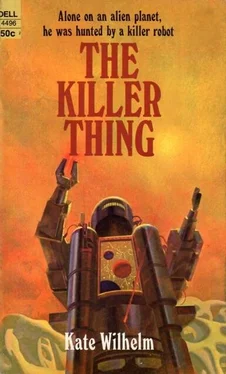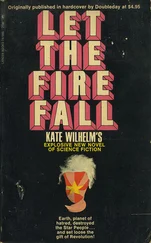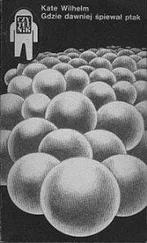He said, “There were rumours here and there when we landed our wounded on Mellic, after the surrender, of course. There are always rumours of big brothers who will pay you back.”
“Of course,” Ching murmured.
The talk shifted to politics and economics and then it was time for the tour, and the party divided into smaller groups to spend the rest of the day riding through the swamps, up and down the gentle hills. General Mulligan was in the lead car, an atomic powered ground effect vehicle. He pointed out the newest in weapons, transportation, defensive shields, and all the while his mind was reviewing the thin stream of rumours he had heard regarding the Outsiders before he had been sent to Venus.
It was said that Mellic had appealed to them for help as soon as the Fleet had left it after the initial contact. The small contingent that had remained had been left strictly alone, and had no suspicion that anything whatever was wrong until the Fleet had returned to be met by Mellic ships, fewer in number, but as fully equipped and as skilfully handled as the WG ships. He hadn’t asked for many ships for the take-over of Mellic; he had thought few would be needed. Of course, when the reinforcements had arrived, the battle had ended abruptly, with absolute surrender of the defenders. And then had come the hints and rumours, none of them taken seriously alone, but together making an impressive, if unproven, catalogue of the Outsiders’ potentialities. Mellic had asked for and received information about space battles, and ships, what was needed, how to manufacture them, how to man them. An army had been raised and trained practically overnight, and no hint of its existence given to the detachment Mulligan left there. They, in fact, had been entertained royally during the three-year wait. After the surrender, when the wounded were put down on Mellic, the rumours had been less than specific: there was another force, farther out; they were peaceful; they were powerful, at least equal to the WG Fleet; they probably were humanoid; they would resist the WG efforts to take the galaxy.
“Venus is the basic training camp for all army personnel,” Mulligan said to the group. “We receive the boys at the age of twelve, school them for the next five years, and then place them where they are most suited. This is the section devoted to the first training of the youngsters.”
The forest of grey-domed buildings had increased in density; it was laid out in rings, each building connected to the next by plastic walkways over the damp ground. There were hundreds of boys in the parade grounds, all dressed in grey shorts, grey shirts, all doing knee bends in unison. Lines of equipment were on another dry area: everything from ground effect cars to space craft. All of the training equipment was of current design. Boys and instructors were around, on, or in all of them. The area was very quiet.
“They have four hours of rigorous exercise, four hours of classwork, two hours of study daily,” Mulligan said. “Gradually as they grow older the exercise is cut to one hour daily, and their classwork is increased to seven hours, with two hours of individual study, and two hours of maintenance work on the various machines they are learning to operate and maintain.”
His voice droned on as they left one area for the next, sometimes being forced to take to the air over tree-like plants that had appeared overnight, again skimming over brick-red water with a poisonous odour, now and then stopping to settle on the ground that felt shivery under the heavy vehicle. “There, gentlemen, is the dredging operation,” he said finally, motioning the driver to stop at the edge of the road. Below them a mammoth bay had been cut out of the land. “As you can see, it is not working at the moment: our latest submarines are all down now trying to extricate a drilling machine from a tar-like layer of ooze they have run into.” A bitter note was in his voice. “They won’t be able to free it. It is sinking slowly despite all their efforts, and if they persist they will get caught in the same filth and go down too.”
A Mars scientist looked at the water with envy, and then turned to the general. “What is the purpose of the operation, sir?”
“We have to blast and dig a channel down into the bedrock under all that gook in order to drain the land,” Mulligan said. “We have tried evaporation; we’ve tried dredging the silt. Our engineers have decided the only approach that is going to work is a two-mile-wide channel a mile deep all the way around the land masses. With the material we’ll then have to work with we will build a sea wall of rock and fill it with the mud…”
“And for that you need the robot…” Ching Li Sung said softly. “Why do you think it will be able to do what your other machines have failed to do?”
“Why not plant bombs?” someone else asked.
“We could use atom bombs,” General Mulligan said even more bitterly, “but Venus government objects. The oceans might get ‘hot’. That mud is such a fine suspension that it would take years for the stuff to settle out again, even a clean bomb… And the robot? It’s a natural. It’s already got the sensors for operating in total darkness; they work around the clock in those mines, you know. And it’s made out of platinum mostly, won’t rust or corrode or dissolve. These are highly acid waters here, all that rotting vegetable matter… And the robot’s got lasers built in already, all this in a small package, manoeuvrable. It’s got treads and wheels, and we can give it buoyancy so that it can stay at any level. And it takes orders. Verbal orders. It can transmit to our men exactly what the conditions are down there, and they can tell it how to cope. See?”
“It would seem,” the intelligence officer remarked in the silence that followed, “that all those things would also apply to it as a fighting instrument.”
Mulligan stared at him through narrowed eyes for a moment. “Men fight our wars,” he said. “It’s men that go out and take the planets and hold them. Men with imagination enough to know when to fire and when to stop, when to kill and when to spare a life. Men who can die, so that the land they died for is worth holding. Every world we take has some of our blood spilled on it, and that’s the kind of tie that even the Outsiders can’t break. You can’t do that with machines, Colonel. You have to take lands with your blood, yours and theirs, mixing together in the dirt so that in the ages to come you can’t tell whose blood it is that nourishes the trees and grasses. Then you know it’s your world, Colonel, and not until then.”
Lieut.-Colonel Howie Langtree loved Venus as much as Mulligan detested it. He had been born on Venus, had entered the youth corps when he was twelve, and for the past twenty-five years had served in the Research Division of the WG army on Venus. He never had been in space, never had been to Earth, or Mars, and had no desire to visit either planet. His loyalties were to Venus, the Venus that he had known all his life.
He was a slight man with pale brown hair, paler brows and lashes, mild blue eyes and a fair skin that freckled easily. He was in the laboratory when the robot was brought in by General Urseline and General Mulligan who was shiny with perspiration. Langtree never perspired. Venus’s climate suited him fine.
He stared at the robot with a stir of interest. It was all that Pietro Urseline had said it was, and probably much more. It stood unmoving, as apart as a machine should be, but with a feeling of anticipation, or restrained power.
“Okay, Pietro,” Mulligan said, walking around the robot curiously, “there it is. Doesn’t look like much, I admit, but give it the works, and don’t dawdle. Give it what it needs to go down and do the job, no more.” He shrugged at the monster and turned to leave. “I don’t envy you your job,” he said. “I’d just as soon try to teach my car to cook for me.” He left and the two scientists glanced at each other. A broad smile appeared on the lean, ascetic face of Urseline.
Читать дальше












